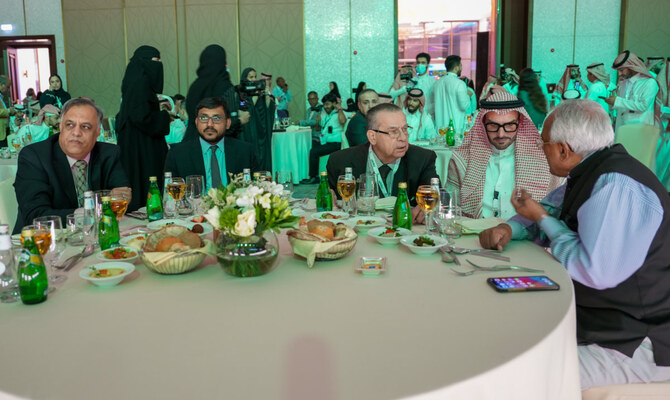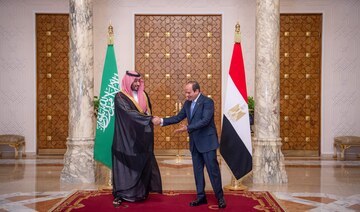RIYADH: Dressing in traditional clothing and glistening gold jewelry is the daily norm for Fatma Abdullah Al-Malak, a 72-year-old, tech-savvy Saudi grandmother from Qatif who is working hard to keep the spirit of local culture alive through her social media activity.
She creates educational content about local heritage and traditions, including clothing and cooking, and shares it on Instagram. In one video, for example, she explains the traditional significance of the Alrdah, a cloak or robe that hangs loosely across the shoulders and is worn by women when they leave the house.
In another, she shows how a millstone, a large round stone made of granite or sandstone, is used to grind wheat into flour.
“I hope (people in the local community) get to know this valuable heritage by learning about it and visiting some local museums we have, and that they feel proud of this heritage,” Al-Malak told Arab News.
“I also hope they will preserve it from extinction as it is part of our identity, for those who do not have a heritage do not have a history.”
Although she continues to live a life that is traditional in many respects, Al-Malak has also moved with the times, embracing the potential of social media to share information and ideas.
Her Instagram feed contains colorful images illustrating the cultural heritage and traditions that have been part of her life, including photos of herself in traditional clothing from the region, in particular a Hashemite dress handed down from her grandmother.
“As for clothing, I only incorporate traditional gold pieces into my daily life,” Al-Malak said. “Yes, there is the Hashemite dress that my grandmother wore and my mother inherited it from her. Now I own this dress and I cherish it greatly. I hope my daughters will value it after me.”
Al-Malak is from Qatif, a municipality in the Eastern Province of Saudi Arabia. It is one of the oldest cities in the region, with rich history and cultural significance, and is known for its traditions of fish farming, agriculture and date palm cultivation.
Her traditional upbringing meant she was surrounded growing up by immediate family, including aunts and uncles. During childhood, she said, her father and grandmother in particular were great sources of inspiration, embodying the wisdom and resilience of the local people.
“(My grandmother) was the foundation of this home and we would gather around her,” Al-Malak said. “She played a role in instilling the qualities of love and affection among us as one family.
“I also learned the love of giving from my father, due to his kind contributions to the community.”
Now Al-Malak is the one teaching her family and caring for them. One of the ways she does this is by cooking traditional dishes, using recipes that were passed down to her through the generations, such as asida, a desert consisting of dough made from wheat flour, topped with honey.
She said her favorite dishes are harees, a hearty, porridge-type meal made from wheat and meat, usually chicken or lamb, and Qatifi kebabs, patties of meat mixed with herbs and spices.
Throughout her life in the Eastern Province, Al-Malak said she has witnessed shifting attitudes toward traditions in recent years, and so her goal is to highlight the important need to preserve local culture and heritage.
“All of our culture and traditions mean a lot to me, they are part of our identity,” she said. “Most of the traditions in our community have disappeared and only a few remain that we still practice.
“Moreover, many modern practices that have nothing to do with our community have (been adopted), such as the ghabqa (a late-night meal during Ramadan), bachelor parties and gender-reveal parties.”
Yet there are often more traditional equivalents for celebrating special occasions. For example, one of her favorite rituals occurs when a couple becomes engaged.
“The groom’s family brings bags of almonds and sweets to the bride’s family,” Al-Malak said. “The bride’s family then places them in a large basket and communicates with a woman whose job is to distribute the almonds and sweets to relatives and neighbors, so everyone is informed about the upcoming wedding.
“Also, a few days before the wedding, the women from the bride’s family and her friends go to the springs to bathe and celebrate the bride.”
In years gone by, Al-Malak said a typical day for a mother would be waking at 6 a.m., preparing breakfast for her family, and eating it together.
“The head of the family goes to work, and the children go to the teacher who teaches them reading and writing,” she added.
“The mother cleans the house and prepares lunch ingredients, then goes out to meet her neighbors while they complete some household tasks like sewing clothes or cleaning vegetables.
“She returns home to cook lunch for the family until they all come back and have lunch together. Then she prepares her children and goes out with them to visit relatives.
“Before sunset, they all return home and she prepares a light dinner for them to enjoy together while sharing conversations or watching television. They all go to bed early.”
In addition to her activities on social media, Al-Malak also participates in local events and initiatives to connect with her local community and help preserve its culture.
“I participated, and continue to participate, in many activities and festivals, including the Wahatna Farhana Festival, National Day celebrations, Al-Burah Festival, World Children’s Day at Prince Mohammed bin Fahd Hospital, Rural Women’s Day, and various activities related to Al-Itaa Women’s Association in Qatif, among many others,” she said.































